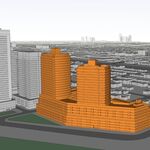TossYourJacket
Senior Member
How messed up do your priorities have to be to vote no on a motion designed to stop cars killing children?
I can think of cycling, especially in the city.I can’t think of a single human activity which is as complex, carried out in such a constantly changing environment, and demanding sustained ongoing attention and careful split second decision-making..... which we allow practically anyone to perform.
Cycling is certainly more demanding and less regulated (doesn't actually require a license), but the nature of it makes it extremely difficult to distract yourself from the task at hand - you have no hands to perform another task as they are required for balance and steering, and the single nature of it makes conversations difficult.I can think of cycling, especially in the city.
because its virtue signalling and will do little to none to actually reduce injuries?How messed up do your priorities have to be to vote no on a motion designed to stop cars killing children?
90% of fatalities and 80% of KSI collisions involving school-aged children in Scarborough happen on arterial roadways. That’s why transportation staff have recommended we target those streets first.
^I was driving on the freeway yesterday and noticed a sign (I’m away from home this week, but Ontario has these also) that said something like “had an accident? move your cars to the shoulder”.
It struck me just how much we assume that there will be auto accidents, and how we have built that assumption into our culture. We put signs up and down our highways because we know there will be accidents every day.
I can’t think of a single human activity which is as complex and carries as huge potential to harm as driving a vehicle - carried out in such a constantly changing environment, and demanding sustained ongoing attention and careful split second decision-making..... which we allow practically anyone to perform.
To pick a comparison - Dentistry? It’s complicated, sure, but the interior of a patient’s mouth does not vary by the second, and even a profound error can at worst cause survivable damage to a single human being. And yet we demand years of study and intensive licensing and testing before we allow an individual to practice.
Flying an airplane? Perhaps more complex, but backed up by far more intensive investment in technology..... and regulated to a greater extent.
My point being - we must not demonize individual motorists for human failure when we have implemented an entire technology with pretty low expectations of human performance, and low expectation of survivability. Nor can we expect generations of people to recalibrate their attitudes or behaviours overnight, just because we have decided to up the standard. Nor can we suddenly preach or rely on silver-bullet solutions (global 30 mph speed limits being one such silver-bullet prescription) and then be upset when these don’t produce immediate success to our newly declared goals.
People need to read a stack of Change Management textbooks, and dwell on what these suggest before they attach themselves to single and simplistic prescriptions.
Our whole planet is built on mobility.
We can’t go cold turkey to achieve Vision Zero.
- Paul
Not our whole planet, North America has a somewhat warped expectation of mobility rights coupled with low skills. And of course we can demonize individual drivers - one's lack of skills, inattentiveness if not downright callousness has maimed and killed. Would said driver has tolerated it if a dentist put a drill through their skull because "my bad"? We have made more restrictive policies on other activities with such a high kill possibility. Driving is not a right - it is a privilege that must be earned - and it seems that's the lesson that needs to be drilled into their heads.
What we need to look at is the risk assessment matrix (frequency and severity) - in the context of road transportation, driving accidents are both frequent and has severe consequences (injury to fatalities - poss. multiple).
It seems weird to me that we can supposedly only lower so many speed limits at a time. Why not just do both?According to Thompson.
Waaaaaait a moment....."at the hands of drivers"? This kind of hyperbole is dog-whistling just as much as treading on race or gender or identity.
Have I missed the spate of pedestrians killing drivers then?
It seems weird to me that we can supposedly only lower so many speed limits at a time. Why not just do both?
Wanting to reduce speeds in school zones does not preclude also wanting to reduce speeds on arterial roads, but okay.It seems weird to me that Councilors would ignore staff recommendations on the issue, and decide they know better.




